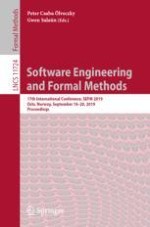2019 | OriginalPaper | Buchkapitel
Learning Minimal DFA: Taking Inspiration from RPNI to Improve SAT Approach
verfasst von : Florent Avellaneda, Alexandre Petrenko
Erschienen in: Software Engineering and Formal Methods
Aktivieren Sie unsere intelligente Suche, um passende Fachinhalte oder Patente zu finden.
Wählen Sie Textabschnitte aus um mit Künstlicher Intelligenz passenden Patente zu finden. powered by
Markieren Sie Textabschnitte, um KI-gestützt weitere passende Inhalte zu finden. powered by
